2015外研版中考英语第41讲 日常交际用语总复习课件
中考外研版英语总复习课件九年级上册Module1—Module2
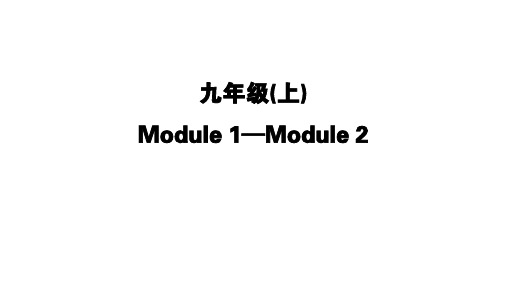
C.between D.about
③The man D those reporters will give an important speech
the evening of May 1st.
A.between;in
B.among;in
C.between;on
D.among;on
6. off用法
(1)adv.& prep.“从……离开;离开” go/run off走/跑开 (2)adv.& prep.“去掉;从……减掉” take 10 percent off削减10% (3)adv.& prep.“不工作;休息” take a day off休假一天
【典题精练】 用beside,near,nearby填空 ①While Jim was walking in the street near his house,he saw Mr.Green was sitting beside his father and drinking coffee in a nearby coffee house. ②On the subway,Sally discovered another handbag beside . hers,then she took it to a nearby police station.
【典题精练】 ①②用remain的适当形式填空 ①All shops in the city center had closed early but many restaurants remained open. ②Mr.Brown has a chance now to do two big good things during his remaining time in office. ③His friends have done their best to point out his mistakes but he remains silent .(silence)
2024年中考外研版英语总复习课件九年级下册Module1—Module4

2.tie (1)n.领带;领结 the red tie红领巾 (2)v.系;捆;扎(用带、绳、线等) (3)固定搭配:tie up系紧;拴牢
①Shirts and __t_ie_s____ have been a symbol of politeness in Britain for centuries.(tie) ②Jack’s mother was __ty_i_n_g___ the shoes for him when the telephone rang.(tie)
①Mrs.White __s_t_u_ck___ the fork into the beef to see if it was
well cooked.(stick)
②It was very cold.He picked up __s_t_ic_k_s__ to make a fire,but
sadly the house caught fire.(stick)
5.see sb. doing sth.用法与拓展 (1)see sb.doing sth.“看见某人正在做某事” (2)see sb. do sth.“看见某人做某事”,强调看见了动作的全 过程。 (3)相同用法还有:hear,notice,watch,feel等感官动词。
【典题精练】
★—Do you often see Tony ___A_____ football in the park?
2.double用法 v.“(使)加倍”,用作及物动词时接名词或代词作宾语;作不 及物动词时常与as,for等介词连用。 adj.“两倍的;双人的”,后接n./pron./num. adv.“双重地;重叠地”n.“两倍;两倍数量”
【典题精练】 ①Officials announced that the number of volunteers helping with rescue(救援) work in Hebei would be _d_o_u_b_l_e_d_.(double) ②It has the __d_o_u_b_le__(双重的) advantage of being both easy and cheap.
2017年外研版中考英语语法情景交际专题复习精选教学PPT
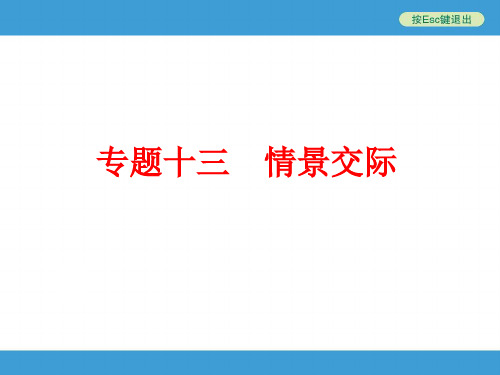
►就餐 1. 主人常用语: (1) What would you like to have? (2) Would you like something to drink? (3) Help yourself to some chicken. (4) Would you like some more rice?
2. 客人常用语: (1) Yes, I'd like a drink. (2) I'd like rice and chicken. (3) Just a little, please. (4) Can I have some more soup? (5) It's so delicious. Thank you. (6) No, thank you. I've had enough. (7) I'm full, thank you.
(7) Merry Christmas! (8) Happy birthday! (9) Congratulations! (10) Well done! 2. 应答用语: (1) Thank you. (2) You, too. (3) The same to you.
►提供帮助和应答 1. 提供帮助: (1) Can I help you? (2)Would you like me to help you? (3) What can I do for you? (4) Let me help you.
2. 肯定答语: (1) Yes, please./Yes, thanks. (2) Thank you (for your help). (3) That would be nice. 3. 否定答语: (1) No,thanks/thank you. (2) That's very kind/nice of you, but I can manage it myself.
15版导与练中考总复习英语外研版教材梳理课件七年级(下)Modules7~12
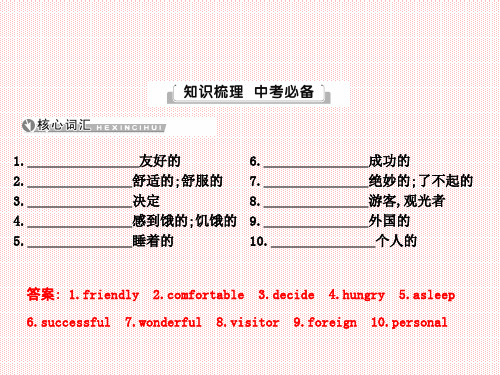
加-ed
加-d 双写辅音字母加-ed 改y为i,加-ed
2.一般过去时态的用法 (1)表示过去某个时间发生的动作或存在的状态。常与last night, yesterday,last week,some years ago,in 1995,in the past,the other day,at that time,just now 等时间状语连用。如: We visited the science museum yesterday. 昨天我们参观了科学博物馆。 (2)表示过去的习惯或经常发生的动作,通常与often,usually,seldom等表 示频度的副词连用,但这种用法是以一个过去时间为前提的。如: Tom often rode his bike to school last term. 上学期汤姆经常骑自行车去上学。
strict的用法 【归纳】 strict意为“严厉的;严格的”。常用于以下短语:
1.be strict with sb. 意为“对某人要求严格”。如:
Teachers should be strict with students. 老师应该对学生严格要求。 2.be strict in sth.意为“对某事要求严格”。如: Mr.Wang is strict in his work. 王老师对他的工作要求很严格。
答案:1.foreign 2.gold 3.noisy 4.successful 5.strict 6.born 7.musician 8.German 9.writer10.friendly 11.Another 12.arrive 13.excited 14.believe
1.how long引导的特殊疑问句,询问时间长短。 ——到那里需要多长时间? ——大约九个小时。 — did it take to get there? —About nine hours. 2.祈使句 多给他们一些私人空间。 them more personal space. 不要站得离北美人太近。 too close to North Americans. 答案:1.How long 2.Give;Don’t stand
中考英语总复习 第二轮 语法考点聚焦 考点跟踪突破41 日常交际用语 外研版
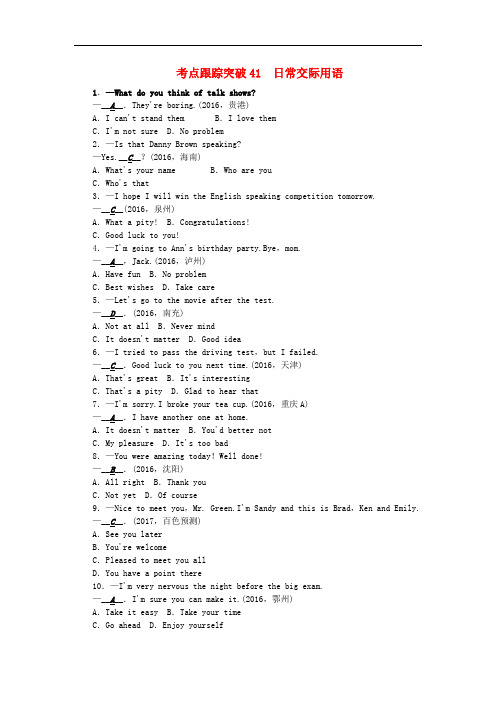
考点跟踪突破41 日常交际用语1.—What do you think of talk shows?—__A__.They're boring.(2016,贵港)A.I can't stand them B.I love themC.I'm not sure D.No problem2.—Is that Danny Brown speaking?—Yes.__C__?(2016,海南)A.What's your name B.Who are youC.Who's that3.—I hope I will win the English speaking competition tomorrow.—__C__(2016,泉州)A.What a pity! B.Congratulations!C.Good luck to you!4.—I'm going to Ann's birthday party.Bye,mom.—__A__,Jack.(2016,泸州)A.Have fun B.No problemC.Best wishes D.Take care5.—Let's go to the movie after the test.—__D__.(2016,南充)A.Not at all B.Never mindC.It doesn't matter D.Good idea6.—I tried to pass the driving test,but I failed.—__C__.Good luck to you next time.(2016,天津)A.That's great B.It's interestingC.That's a pity D.Glad to hear that7.—I'm sorry.I broke your tea cup.(2016,重庆A)—__A__.I have another one at home.A.It doesn't matter B.You'd better notC.My pleasure D.It's too bad8.—You were amazing today!Well done!—__B__.(2016,沈阳)A.All right B.Thank youC.Not yet D.Of course9.—Nice to meet you,Mr. Green.I'm Sandy and this is Brad,Ken and Emily. —__C__.(2017,百色预测)A.See you laterB.You're welcomeC.Pleased to meet you allD.You have a point there10.—I'm very nervous the night before the big exam.—__A__.I'm sure you can make it.(2016,鄂州)A.Take it easy B.Take your timeC.Go ahead D.Enjoy yourself11.—There will be more and more robots going into people's homes.—__D__.We might be able to leave all the chores to them.(2016,宜昌)A.Not really B.No wayC.You're kidding D.I hope so12.—I'll have an important meeting this weekend,so I can't go fishing with you.—__C__.I thought we could have a nice time together.(2017,桂林预测)A.It's a pleasure B.You're welcomeC.What a pity D.I am sure13.—Attention,please!I have good news for you about your flight.—__D__?(2016,宜昌)A.What are they B.Where is itC.How are you D.What is it14.—__A__,or we'll be late for the meeting.—It's only half past one by my watch.We have enough time left.(2016,襄阳) A.Hurry up B.Don't worryC.Never mind D.Be quiet15.—Excuse me,where's the meeting room?—__A__.I will show you there.(2016,泰州)A.This way,please B.That's rightC.I can manage D.In your dreams16.—I think students can have mobile phones to help with their studies.(2016,武汉)—__B__.They often use them to play games.A.I think so B.I don't agreeC.No problem D.That's a good idea17.—Larry,can you go to the concert with me this Wednesday evening?—Sure!__A__.(2016,济南)A.Catch you on Wednesday B.CongratulationsC.Welcome to my concert D.I'm afraid not18.—It shouldn't take long to clear up after the party if we all volunteer to help.—That's right.__A__.(2016,咸宁)A.Many hands make light workB.Something is better than nothingC.The sooner begun,the sooner doneD.Practice makes perfect。
外研版八下M4U1复习课件
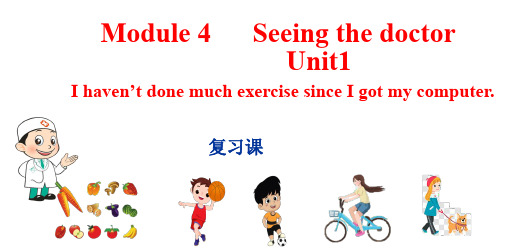
口头表达 建议时间:2分钟
2….hurt 他的头/肚子疼。
大声朗读句子,至少3遍!
她的牙/腿/胳膊/眼睛/耳朵疼。
1. I have got a stomach ache/ headache / toothache/ cough / fever. 2. His head / stomach hurts.
Her teeth/ legs / arms / eyes / ears hurt.
用所给的词或短语完成下列句子
3.That’s why ①这就是你肚子疼的原因。 ②这就是他感冒的原因。
将句子写在练习本上,标好序号 建议时间:3分钟
对完答案后大声朗读句子, 至少3遍!
③这就是我们必须每天测体温的原因。
内容:口语练习,大声朗读 建议时间:2分钟
Daming:No, not usually. Doctor:That's the problem! _________________________.____________________________ ____________. Daming:What about the headache? Doctor: Do you do any exercise? Daming:Not really. _____________________________________________. Doctor:You spend too much time in front of the computer. __________________________________. Daming:OK, so what should I do? Doctor:Well, don't worry.It's not serious. _____________________________________. _____________________________________. And ___________________________.___________. Daming:Thank you, doctor.
2015中考英语总复习 知识清单 第二部分 语法专题突破 专题十五 情景交际与图识标志课件

Take this medicine and stay in bed for a few days. 吃这个药并卧床休息几天。 You will get better soon. 你会很快好起来的。 You will be all right/well soon. 你会很快没事的。
◆病人常用的交际用语 I have got a headache/cough. 我头痛/咳嗽。 I’m not feeling well./I don’t feel very well./I feel terrible. 我感觉不舒服。 There’s something wrong with... ……不舒服。 I’m sorry to hear that. 听到……我很遗憾。
◆顾客常用的交际用语 I want/would like to buy some...(for...)我想
(为……)买一些……
I’m looking for...我正在找…… I would like/want two kilos of... 我想买两千克…… I like the colour, but it’s/they’re too... 我喜欢这个 颜色,但它/它们太……
听力中的高频话题Biblioteka :谈论天气,询问交通方式,邀请,看病,订餐等,学生也应加以重视。
考点一 常考交际用语
1.购物 (2014年2次,2013年2次,2012年2次) ◆营业员常用的交际用语 Can I help you?/What can I do for you? 你要买什 么?
How many/much...do you want? 你要多少……?
◆忧虑 What’s wrong? 怎么了? What’s the matter? 出什么问题了? Anything wrong? 有什么问题吗?
中考英语专题情景与交际运用外研社知识精讲
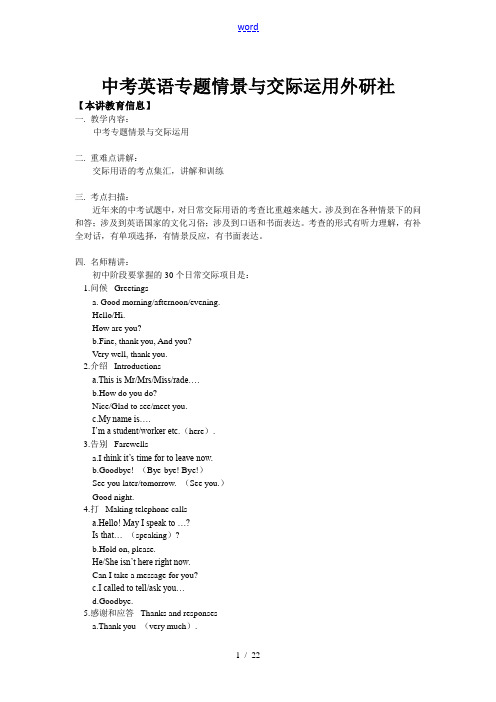
中考英语专题情景与交际运用外研社【本讲教育信息】一. 教学内容:中考专题情景与交际运用二. 重难点讲解:交际用语的考点集汇,讲解和训练三. 考点扫描:近年来的中考试题中,对日常交际用语的考查比重越来越大。
涉及到在各种情景下的问和答;涉及到英语国家的文化习俗;涉及到口语和书面表达。
考查的形式有听力理解,有补全对话,有单项选择,有情景反应,有书面表达。
四. 名师精讲:初中阶段要掌握的30个日常交际项目是:1.问候Greetingsa. Good morning/afternoon/evening.Hello/Hi.How are you?b.Fine, thank you, And you?Very well, thank you.2.介绍Introductionsa.This is Mr/Mrs/Miss/rade….b.How do you do?Nice/Glad to see/meet you.c.My name is….I’m a student/worker etc.(here).3.告别Farewellsa.I t hink it’s time for to leave now.b.Goodbye! (Bye-bye! Bye!)See you later/tomorrow. (See you.)Good night.4.打Making telephone callsa.Hello! May I speak to …?Is that… (speaking)?b.Hold on, please.He/She isn’t here right now.Can I take a message for you?c.I called to tell/ask you…d.Goodbye.5.感谢和应答Thanks and responsesa.Thank you (very much).Thanks a lot.Many thanks.Thanks for…b.Not at all.That’s all right.You’re wele.6.祝愿,祝贺和应答Good wishes, congratulations, responsesa.Good luck!Best wishes to you.Have a nice/good time.Congratulations!c.Thank you.d.Happy New Year!Merry Christmas!Happy birthday to you.e.The same to you.7.意愿IntentionsI’m going to…I will...I’d like to…I want/hope to…8.道歉和应答Apologies and responsesa.I’m sorry. (Sorry.)I’m sorry for/about…Excuse me.b.That’s all right.It doesn’t matter.That’s nothing.9.遗憾和同情Regrets and sympathyWhat a pity!I’m sorry to hear…10.邀请和应答Invitations and responsesa.Will you e to…?Would you like to…?b.Yes, I’d love to…Yes, it’s very kind/nice of you.c.I’d love to, but…11.提供(帮助等)和应答Offers and responsesa.Can I help you?What can I do for you?Here, take this/my…Let me…for you.Would you like some…?b.Thanks. That would be nice/fine.Thank you for your help.Yes, please.c.No, thanks/thank you.That’s very kind of you, but…12.请求允许和应答Asking for permission and responsesa.May I…?Can/Could I…?b.Yes/Certainly.Yes, do please.Of course (you may).That’s Ok/all right.c.I’m sorry, but…You’d better not.13.表示同意和不同意Expressing agreement and disagreementa.Certainly/Sure/Of course.Yes, please.Yes, I think so.b.That’s true/OK.That’s a good idea.I agree (with you).c.No, I don’t think so.I’m afraid not.I really can’t agree with you.14.表示肯定和不肯定Expressing certainty and uncertaintya.I’m sure.I’m sure (that)…b.I’m not sure.I’m not sure whether/if…c.Maybe/Perhaps15.喜好和厌恶Likes and dislikesa.I like/love… (very much).I like/love to…b.I don’t like (to)…I hate (to)…16.谈论天气Talking about the weathera.What’s the weather like today?How’s the weather in…?b.It’s fine/cloudy/windy/rainy, etc.It’s rather warm/cold/hot/etc. today, isn’t it?17.购物Shoppinga.What can I do for you?May/Can I help you?b.I want/I’d like…How much is it?That’s too much/expensive, I’m afraid.That’s fine. I’ll take it.Let me have…kilo/box, etc.c.How many/much do you want?What colour/size/kind do you want?d.Do you have any other kind/size/colour,etc.?18.问路和应答Asking the way and responsesa.Excuse me. Where’s the men’s/ladies’ room?Excuse me, can you tell me the way to…?How can I get to…? I don’t know the way.b.Go down this street.Turn right/left at the first/second crossing.It’s about …metres from here.19.问时间或日期和应答Asking the time or date and responsesa.What day is (it)today?What’s the date today?What time is it?What’s the time, please?b.It’s Monday/Tuesday, etc.It’s January 10th.It’s five o’clock/half past five/a quarter to five/five thirty, etc. It’s time for…20.请求Requestsa.Can/Could you…for me?Will/wo uld you please…?May I have…?b.Please give/pass me…Please wait (here/a moment).Please wait for your turn.Please stand in line/line up.Please hurry.c.Don’t rush/crowd.No noise, please.No smoking, please.21.劝告和建议Advice and suggestionsa.You’d better…You should…You need (to)…b.Shall we…?Let’s…What /How about…?22.禁止和警告Prohibition and warningsa.You can’t/mustn’t…If you…, you’ll…b.Take care !Be careful !Look out !23.表示感情Expressing certain emotionsa.喜悦Pleasure, joyI’m glad/pleased/happy to…That’s nice.That’s wonderful/great.b.焦虑AnxietyWhat’s wrong?What’s the matter (with you)?I’m/He’s/She’s worried.Oh, what shall I/we do?c.惊奇SurpriseReally?Oh dear?Is that so?24.就餐Taking mealsa.What would you like to have?Would you like something to eat/drink?b.I’d like…Would you like some more…?Help yourself to some…c.Thank you. I’ve had enough/Just a little, please.25.约会Making appointmentsa.Are you free this afternoon/evening?How about tomorrow morning/afternoon/evening? S hall we meet at 4: 30 at…?b.Yes, that’s all right.Yes, I’ll be free then.c.No, I won’t be free then. But I’ll be free…e. All right. See you then.26.传递信息Passing on a messagea.Will you please give this note/message to…?b.asked me to give you this note.c.Thanks for the message.27.看病Seeing the doctora.There’s something wrong with…I’ve got a cough.I feel terrible(bad).I don’t feel well.I’ve got a pain here.This place hurts.b.Take this medicine three times a day.Drink plenty of water and have a good rest.It’s nothing serious.You’ll be right/well soon.28.求救Calling for helpa.Help!b.What’s the matter?29.语言困难Language difficultiesPardon.Please say that again/more slowly.What do you mean by…?I’m sorry I can’t follow you.I’m s orry I know only a little English.同学们在中考复习时,首先应熟记教材第一至三册中出现的常用交际用语和习惯表达法。
- 1、下载文档前请自行甄别文档内容的完整性,平台不提供额外的编辑、内容补充、找答案等附加服务。
- 2、"仅部分预览"的文档,不可在线预览部分如存在完整性等问题,可反馈申请退款(可完整预览的文档不适用该条件!)。
- 3、如文档侵犯您的权益,请联系客服反馈,我们会尽快为您处理(人工客服工作时间:9:00-18:30)。
,漳州)
【考点梳理】 中考对日常交际用语的考查比重越来越大。涉及在各
种情景下的问和答以及英美国家的文化习俗。答题时要
注意:语进行选择;
3.使用文明礼貌的语言; 4.遵照口语交际特点,不要死套语法规则。
高频考点一 感谢与应答 Thank you./Thanks./Thank you very much./Thank you so much./Thanks a lot. You're kind! Thank you all the same. You're welcome./Not at all./Don't mention it./It's my pleasure./That's all right. 【例1】 —Mike,thank you for driving me home. —_ C _.Have a nice day!(2014,温州) A.That's right B.I'm afraid not C.You're welcome D.It's a good idea 点拨:上句为“迈克,谢谢你开车送我回家。”A为“没关 系”;B为“恐怕不行”;C为“不客气”;D为“这是个好 主意”。
2.当某人外出旅行时
Good luck with your trip!Have a good trip/journey. =I wish you a good trip/journey./Good trip to you. Have a nice/pleasant/wonderful time. =I wish you a nice/pleasant/wonderful time.
【例2】 —Congratulations!You've got a chance to take part in the talk show. —__ A _. A.Thank you B.I agree C.Good luck D.You're welcome 点拨:对别人的祝贺要表示感谢。 高频考点二 祝愿与祝贺 1.当某人取得成功时 Well done!Congratulations(to you)!
第41讲 日常交际用语
【真题体验】 1.—My mother has been ill for several days. —__B__(2014,铜仁) A.That's too bad. B.I'm sorry to hear that. C.How terrible! D.Never mind. 2.—Bill,can I get you anything to drink? —__C__.(2014,黄冈) A.You are welcome B.No problem C.I wouldn't mind a coffee D.It doesn't matter 3.—Would you mind not putting your bike here?An English party will be held here. —__A__.I'll put it somewhere else. A.Not at all B.Yes,I'd love to C.Certainly D.Of course
Have fun!
Enjoy yourself/yourselves! 3.在某人生日时 —Happy birthday to you!-Thank you!
4.当某人即将做某事时 Good luck(to you)!(I wish you success!) 5.上述几点中祝愿(贺)的回答可用: Thanks./Thank you./Thanks a lot.或It's kind of you to say so. 6.在公共节日里 Happy New Year(to you)!新年快乐! Thanks.The same to you!(Happy New Year to you,too!) 谢谢!您也一样!(也祝您新年快乐!) 【例3】 —Our team won the game yesterday. —__ A _! A.Well done B.Good luck C.Don't mention it D.That's OK 点拨:对于获得成功时应表示赞扬。
4.—Mum,I've got the first prize in the photo competition. —__D__(2014,黔西南) A.Good luck! B.Not at all. C.Good idea! D.Congratulation! 5.When seeing Sign __C__,we have to drive straight.(2014
C.Don't be silly D.I'd love to
点拨:对于对方丢苹果手机的事应表示同情。
高频考点四 提醒和警告 1.祈使句表示提醒、禁止和警告。 Look out!/Be careful!/Take care!/Danger!/Slow down! /Entrance!/Exit!/Stop! 2.下列句型也可用来表示警告: Don't do sth.„or„ If you„you„ 3.以否定祈使句或“No+v.ing”表示提醒、禁止和警告。 Don't feed the animals! Don't forget to water your plant! Don't smoke!/Don't be late! No smoking!/No parking!/No spitting!
【例4】 —I'm going to take part in China's Got Talent next
month.
—__ B _!I am sure you will win.(2014,广东) A.Never mind B.Good luck
C.What a pity D.My pleasure
点拨:上句为“我下个月要参加《中国达人秀》”。 对别人做某事表示良好祝愿要用“Good luck”。 高频考点三 表示遗憾、同情 1.表遗憾时
be afraid(that)„
It's a pity(that)„What a pity!
2.表同情时
I'm sorry to hear„
【例5】 —My new iPhone was stolen when I took a bus yesterday. —__ A _.(2014,梅州) A.I'm sorry to hear that B.It doesn't matter
